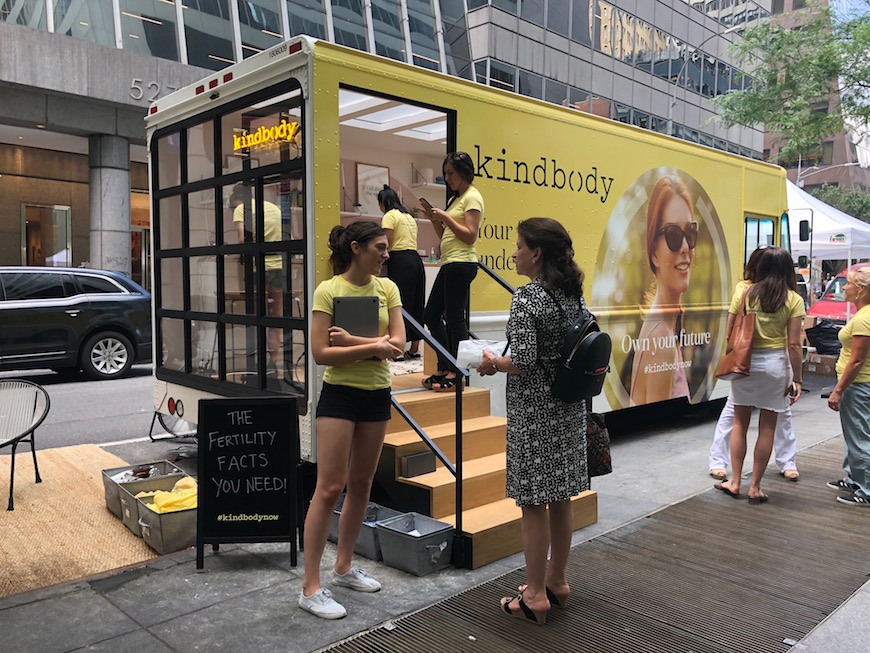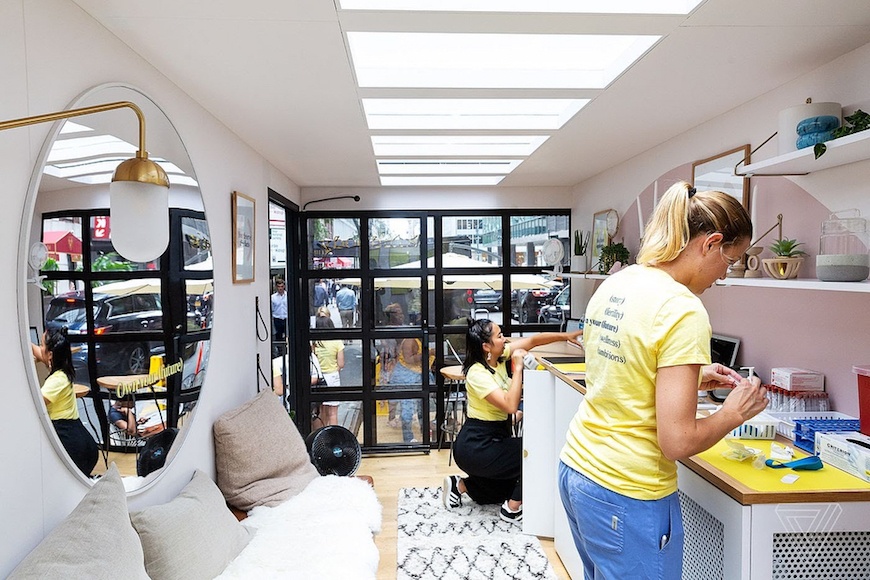Well and Good | Emily Laurence
October 3, 2018

Photo: Kindbody
It’s 9:30 a.m. on a weekday, and a growing line of women is forming on a busy Midtown block in New York City. Is a celeb graciously posing for pics? A café handing out free matcha? Nope. These women are waiting their turn to climb aboard a buttercup yellow van to have their fertility tested.
“We’re reinventing healthcare for the modern woman, starting with fertility and wellness services,” says Kindbody co-founder Joanne Schneider. In conjunction with opening its first clinics (one is now open in NYC, with a second planned for early 2019, while a San Francisco location is in the works), she’s overseeing the company’s pop-up, a mobile fertility van offering free fertility testing to women. “One of our big missions is to start normalizing the conversation around fertility,” Schneider says.
Fahimeh Sasan is a board-certified OB-GYN and one of Kindbody’s founding physicians. She’s been practicing for 12 years and says it’s rare that women ask about fertility during appointments. Usually, they get their pap smear done or their birth control prescription written and that’s it, appointment over. But if you aren’t thinking about getting pregnant right now—as in, it could not be more off your radar—is the conversation even worth having? Can’t it wait until you’ve figured out your 401(k) or at least, you know, don’t have roommates? Dr. Sasan says if you’re over 25, it’s absolutely worth bringing up with your MD.

“I often have patients who are 39 or 40, ready to get pregnant, and then have trouble conceiving,” she says. “It’s heartbreaking.” With 10 percent of women having trouble getting or staying pregnant, Dr. Sasan advocates arming yourself with as much knowledge as you can before you technically need it.
“I think there’s this preset plan people make for themselves of when they’re ‘supposed’ to have children or get married,” Schneider says. “Starting the conversation about egg freezing can feel almost like admitting you’ve failed your plan. It’s scary.” But that’s far from the truth: Knowing your fertility status can help you live out more of your life goals, on your timeline, Schneider says.
Because fertility isn’t exactly the easiest topic to bring up, Kindbody aims to be as approachable as possible. The doctors don’t wear lab coats and the offices look more like a chic hangout than a clinic. The fertility van has the same vibe, with sheepskin throws, millennial-pink walls, and gold accent lamps.
The type of fertility test they’re administering is an anti-mullerian hormone test, or AMH for short. “This is a common fertility test that gives a general assessment of a woman’s ovarian function as well as a rough estimate of the quantity of eggs that they have,” Dr. Sasan says. “I use the words ‘general’ and ‘estimate’ because that’s truly what it is. There’s no positive-negative fertility test. And this is certainly only one piece of the equation.” It’s a starting point; the beginning of a conversation, not the end.
“There’s this preset plan people make for themselves of when they’re ‘supposed’ to have children or get married. Starting the conversation about egg freezing can feel almost like admitting you’ve failed your plan.” —Joanne Schneider, Kindbody co-founder
Kindbody is giving the AMH tests completely for free (it can cost up to $200, depending on your insurance), which are then sent to Quest Diagnostics to be analyzed. Then, Dr. Sasan calls anyone who has results outside of the normal range. “Certainly if you are out of the normal range, it does not mean you are infertile or can’t have children,” Dr. Sasan says. “I tell the women, ‘listen, I’m glad you found this information out. Now you can be proactive about it.’”
Besides fertility testing, Kindbody’s brick-and-mortar clinics also offer egg freezing, and Schneider says they’ll soon offer the whole spectrum of gynecological services, as well as health coaching. “Nutrition counseling is a big service that can help with infertility,” she says. And of course, anxiety and depression are so prevalent that we want to address [those issues], too.”
More Press
Kindbody’s Dr. Fahimeh Sasan on The Hendy Show
In this episode, Amanda welcomes Dr. Fahimeh Sasan, Founding Physician & Chief Innovation Officer at Kindbody. You’ll learn the ins and outs of fertility treatment, from the emotional to practical.
Dr. Erica Louden on Chicago Tonight
Dr. Erica Louden (Kindbody Chicago) weighs in on the controversial IVF ruling in Alabama.